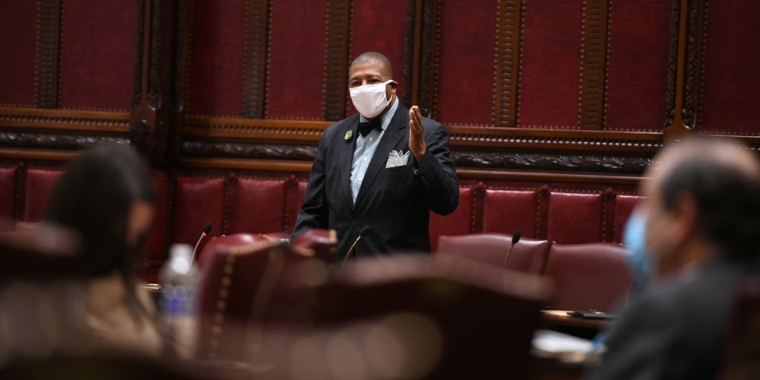
State Senate Passes Senator Sanders' Bills on Finance and Veterans' Health
June 2, 2021

Senator James Sanders Jr. today saw four important pieces of his legislation pass the senate.
Bill S1566A - This bill would require banks to inform customers of any consequences to their credit score when the bank has agreed to an alternative payment schedule.
This legislation addresses the practice some banks use by which they arrange an alternative payment schedule with a customer and leave the customer with the impression that this arrangement will prevent the financial institution from hurting the customer's credit rating.
"When an alternative payment schedule is arranged, a bank may still report a customer as being late on their payments even though they have worked out a compromised alternative." Senator Sanders said. "Most customers are unaware of this and don't that the alternative payment schedule is really not helping them preserve their credit rating."
Bill S1788A - Creates a temporary veterans' mental health and suicide prevention task force
"As a Marine Corps veteran, this bill is especially important to me because I am concerned with the health, safety and welfare of all returning veterans of the United States armed forces to New York and the high rate of mental health problems and suicides among these services members," Senator Sanders said.
Bill S191 -This legislation authorizes credit unions to participate in the Excelsior Linked Deposit Program and raises the limit on the amount permitted to be on deposit at any given time.
In the past 35 years as New York has shifted from a manufacturing to a service economy, some of the largest companies in the state (many of which sponsor a credit union for the benefit of their employees) have downsized, forcing thousands of credit union members to become self-employed. Credit unions have responded to the needs of their members by offering business loans. In most instances, members have sought assistance from their credit union for business loans primarily for the same reason they joined the credit union; because they were denied a loan (in this example, a business loan) at another financial institution.
With the State's economic and employment fortunes resting on the success of small business, it is increasingly evident that small businesses must have greater access to capital through a wider range of lenders. Since their inception, credit unions have filled an important niche in serving communities underserved by commercial banks and thrifts. Over 700 credit unions across the State play an integral role in serving the financial needs of 3.5 million New Yorkers. Credit unions were created as a not-for-profit alternative to other financial institutions primarily because working-class individuals were being denied business through the ELDP which is a natural extension of the credit union mission.
Bill S6070A - Directs the department of financial services to conduct a study on the impacts of the coronavirus (COVID-19) pandemic on underbanked and underserved areas and small businesses and Minority-and-Women-Owned Business Enterprises (MWBEs) getting loans.
"Minority and low-income communities were hit especially hard by COVID-19, according to news reports since the pandemic began in New York State in March 2020," Senator Sanders said. "Given the importance of banking to everyone, policymakers and the public have an interest in understanding how the pandemic impacted minority and low-income communities as it relates to the banking sector and to learn how these problems can be addressed."
Share this Article or Press Release
Newsroom
Go to Newsroom"Breaking Ground" Senator Sanders' Cannabis Education Initiative
August 20, 2021



